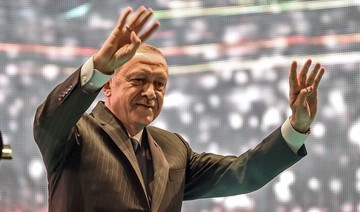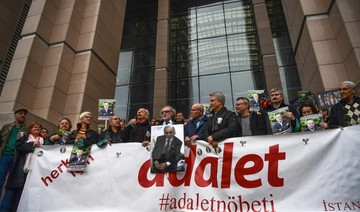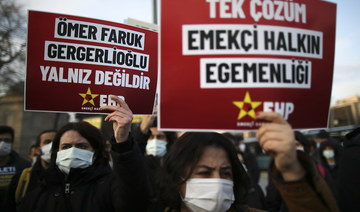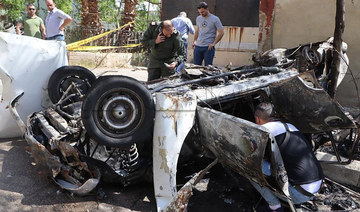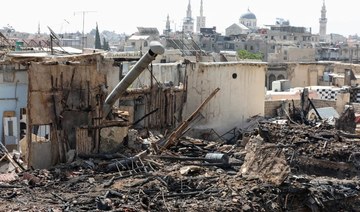ISTANBUL: Unzile Aksakoglu struggles to explain to her seven-year-old daughter why her father Yigit has spent four months in jail and may never leave, because of his alleged role in mass protests against Turkey’s government when she was just a year old.
After all, the people originally prosecuted over the 2013 protests — which began against the redevelopment of central Istanbul’s Gezi Park and grew into nationwide anti-government unrest — were acquitted.
A Turkish judge ruled in 2015 that the protesters were exercising the right of freedom of assembly in what turned out to be the biggest popular challenge to Tayyip Erdogan’s rule.
But in November, Yigit Aksakoglu was detained and is now facing trial with 15 other civil society figures, writers and actors. For a while Aksakoglu’s family hoped he would soon be released, but then on March 4, a 657-page indictment was released saying they had masterminded an attempt to overthrow Erdogan’s government.
“I say to her, ‘I promise I and your daddy’s friends will get him out. Don’t worry. This misunderstanding will end.’ But a part of me is really scared,” Unzile said.
Supporters of the detainees say the indictment contains no evidence and many bizarre accusations, and marks a new low for a country where 77,000 people already been jailed in a crackdown following a failed military coup in 2016.
The European Union said that by seeking life sentences, prosecutors were creating a climate of fear in Turkey, while the US State Department has said Washington is gravely concerned.
The arrests are the latest step in a crackdown which Turkey says is a necessary response to security threats that the country faces and which has involved widespread purges in the armed forces, ministries and state organizations.
In the summer of 2013, hundreds of thousands marched in Istanbul and across Turkey to protest against plans to build replica Ottoman barracks on Gezi Park by Istanbul’s Taksim Square, chanting “everywhere is Taksim, everywhere is resistance.”
Eight young protesters and a police officer were killed in the unrest and 5,000 injured. The indictment, formally accepted by an Istanbul court on March 4, says hundreds of properties were damaged in the protests.
It also includes assertions that rights groups have dismissed as fanciful conspiracies.
It says the protests were organized by local extensions of “forces which control global capital,” singling out billionaire philanthropist George Soros. Erdogan has vilified Soros as “the famous Hungarian Jew ... who assigns people to divide nations.”
The indictment says the “Gezi Uprising” was fueled by Osman Kavala, a well-known civil society leader and businessman who has been in jail since October 2017.
A picture from Kavala’s phone taken from an academic book showing how different types of bees are distributed across the Middle East was described in the indictment as showing Turkey’s borders violated and redrawn.
It said the fact that defendants discussed bringing milk, juice and pastries to Gezi, as well as gasmasks to counter the effects of tear gas, showed they were financing the protests.
The Taksim Solidarity group, which includes some of the 16 defendants, poured scorn on the indictment, saying it portrayed the handing out of flowers to police and the provision of sandwiches to protesters as signs of guilt.
The demonstrations, the indictment says, were inspired by the worldwide “Occupy” protests and Arab uprisings starting in 2011 and a book by Boston-based academic Gene Sharp called ‘From Dictatorship to Democracy’.
The indictment cites Gezi protest acts that matched Sharp’s non-violent protest methods, such as Roger Waters’ “The Wall” concert in Istanbul in August 2013 when photos of people killed in the protests were displayed on a huge stage backdrop.
Amnesty International Turkey representative Andrew Gardner described the case as “an attempt to rewrite history” and said the request for life sentences without parole represented a “massive escalation” in Turkey’s crackdown on civil society.
“What we are facing is an existential crisis for independent civil society in Turkey,” he said. “It is a blatant attempt to scare and pursue critics on completely trumped-up, fanciful conspiracy theories.”
Erdogan equates the Gezi protesters with Kurdish militants and those accused of carrying out a failed coup in 2016. In campaigning for March 31 local elections he has often accused opposition parties of being allied with militants.
The protests began to prevent the redevelopment of a park in a city with limited green space, but Erdogan dismissed the idea of environmental motivation, saying: “Those who planned and financed the Gezi events, tried to overthrow the government using 12 trees as an excuse are giving account to the judiciary.
“No one in Turkey gets away with crimes they committed any more,” the president said in a speech last week.
Turkey escalates crackdown on dissent six years after Gezi protests
Turkey escalates crackdown on dissent six years after Gezi protests
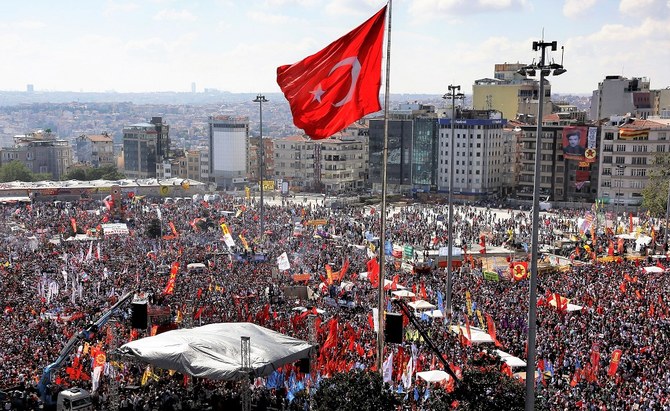
- The EU said that by seeking life sentences, prosecutors were creating a climate of fear in Turkey
- Arrests are latest step in a crackdown which Turkey says is a necessary response to security threats
Hamas sending delegation to Egypt for further ceasefire talks in latest sign of progress

- After months of stop-and-start negotiations, the ceasefire efforts appear to have reached a critical stage
- Question remains whether Israel will accept end to war without reaching its stated goal of destroying Hamas
BEIRUT: Hamas said Thursday that it was sending a delegation to Egypt for further ceasefire talks, in a new sign of progress in attempts by international mediators to hammer out an agreement between Israel and the militant group to end the war in Gaza.
After months of stop-and-start negotiations, the ceasefire efforts appear to have reached a critical stage, with Egyptian and American mediators reporting signs of compromise in recent days. But chances for the deal remain entangled with the key question of whether Israel will accept an end to the war without reaching its stated goal of destroying Hamas.
The stakes in the ceasefire negotiations were made clear in a new UN report that said if the Israel-Hamas war stops today, it will still take until 2040 to rebuild all the homes that have been destroyed by nearly seven months of Israeli bombardment and ground offensives in Gaza. It warned that the impact of the damage to the economy will set back development for generations and will only get worse with every month fighting continues.
The proposal that US and Egyptian mediators have put to Hamas -– apparently with Israel’s acceptance — sets out a three-stage process that would bring an immediate six-week ceasefire and partial release of Israeli hostages, but also negotiations over a “permanent calm” that includes some sort of Israeli withdrawal from Gaza, according to an Egyptian official. Hamas is seeking guarantees for a full Israeli withdrawal and complete end to the war.
Hamas officials have sent mixed signals about the proposal in recent days. But on Thursday, its supreme leader, Ismail Haniyeh, said in a statement that he had spoken to Egypt’s intelligence chief and “stressed the positive spirit of the movement in studying the ceasefire proposal.”
The statement said that Hamas negotiators would travel to Cairo “to complete the ongoing discussions with the aim of working forward for an agreement.” Haniyeh said he had also spoken to the prime minister of Qatar, another key mediator in the process.
The brokers are hopeful that the deal will bring an end to a conflict that has killed more than 34,000 Palestinians, according to local health officials, caused widespread destruction and plunged the territory into a humanitarian crisis. They also hope a deal will avert an Israeli attack on Rafah, where more than half of Gaza’s 2.3 million people have sought shelter after fleeing battle zones elsewhere in the territory.
If Israel does agree to end the war in return for a full hostage release, it would be a major turnaround. Since Hamas’ Oct. 7 attack stunned Israel, its leaders have vowed not to stop their bombardment and ground offensives until the militant group is destroyed. They also say Israel must keep a military presence in Gaza and security control after the war to ensure Hamas doesn’t rebuild.
Publicly at least, Israeli Prime Minister Benjamin Netanyahu continues to insist that is the only acceptable endgame.
He has vowed that even if a ceasefire is reached, Israel will eventually attack Rafah, which he says is Hamas’ last stronghold in Gaza. He repeated his determination to do so in talks Wednesday with US Secretary of State Antony Blinken, who was in Israel on a regional tour to push the deal through.
The agreement’s immediate fate hinges on whether Hamas will accept uncertainty over the final phases to bring the initial six-week pause in fighting — and at least postpone what it is feared would be a devastating assault on Rafah.
Egypt has been privately assuring Hamas that the deal will mean a total end to the war. But the Egyptian official said Hamas says the text’s language is too vague and wants it to specify a complete Israeli pullout from all of Gaza. The official spoke on condition of anonymity to talk about the internal deliberations.
On Wednesday evening, however, the news looked less positive as Osama Hamdan, a top Hamas official, expressed skepticism, saying the group’s initial position was “negative.” Speaking to Hezbollah’s Al-Manar TV, he said that talks were still ongoing but would stop if Israel invades Rafah.
Blinken hiked up pressure on Hamas to accept, saying Israel had made “very important” compromises.
“There’s no time for further haggling. The deal is there,” Blinken said Wednesday before leaving for the US
An Israeli airstrike, meanwhile, killed at least five people, including a child, in Deir Al-Balah in central Gaza. The bodies were seen and counted by Associated Press journalists at a hospital.
The war broke out on Oct. 7. when Hamas militants broke into southern Israel and killed over 1,200 people, mostly Israelis, taking around 250 others hostage, some released during a ceasefire on November.
The Israel-Hamas war was sparked by the Oct. 7 raid into southern Israel in which militants killed around 1,200 people, mostly civilians, and abducted around 250 hostages. Hamas is believed to still hold around 100 hostages and the remains of more than 30 others.
Since then, Israel’s campaign in Gaza has wreaked vast destruction and brought a humanitarian disaster, with several hundred thousand Palestinians in northern Gaza facing imminent famine, according to the UN More than 80 percent of the population has been driven from their homes.
The “productive basis of the economy has been destroyed” and poverty is rising sharply among Palestinians, according to the report released Thursday by the United Nations Development Program and the Economic and Social Commission for Western Asia.
It said that in 2024, the entire Palestinian economy — including both Gaza and the West Bank -– has so far contracted 25.8 percent. If the war continues, the loss will reach a “staggering” 29 percent by July, it said. The West Bank economy has been hit by Israel’s decision to cancel the work permits for tens of thousands of laborers who depended on jobs inside Israel.
“These new figures warn that the suffering in Gaza will not end when the war does,” UNDP administrator Achim Steiner said. He warned of a “serious development crisis that jeopardizes the future of generations to come.”
Israel builds ‘cyber dome’ against Iran’s hackers

- Israeli cybersecurity agency had thwarted around 800 significant attacks since the Oct. 7 Gaza war erupted
- But some attacks could not be foiled, including against hospitals in which patient data was stolen
TEL AVIV: Israel’s Iron Dome defense system has long shielded it from incoming rockets. Now it is building a “cyber dome” to defend against online attacks, especially from arch foe Iran.
“It is a silent war, one which is not visible,” said Aviram Atzaba, the Israeli National Cyber Directorate’s head of international cooperation.
While Israel has fought Hamas in Gaza since the October 7 attack, it has also faced a significant increase in cyberattacks from Iran and its allies, Atzaba said.
“They are trying to hack everything they can,” he told AFP, pointing to Hamas and Lebanon’s Hezbollah movement but adding that so far “they have not succeeded in causing any real damage.”
He said around 800 significant attacks had been thwarted since the war erupted. Among the targets were government organizations, the military and civil infrastructure.
Some attacks could not be foiled, including against hospitals in the cities of Haifa and Safed in which patient data was stolen.
While Israel already has cyber defenses, they long consisted of “local efforts that were not connected,” Atzaba said.
So, for the past two years, the directorate has been working to build a centralized, real-time system that works proactively to protect all of Israeli cyberspace.
Based in Tel Aviv, the directorate works under the authority of the prime minister. It does not reveal figures on its staff, budget or computing resources.
Israel collaborates closely with multiple allies, including the United States, said Atzaba, because “all states face cyber terrorism.”
“It takes a network to fight a network,” he said.
Israel’s arch foe Iran is “an impressive enemy” in the online wars, said Chuck Freilich, a researcher at the Institute for National Security Studies, which is affiliated with Tel Aviv University.
“Its attacks aim to sabotage and destroy infrastructure, but also to collect data for intelligence and spread false information for propaganda purposes,” he said.
Iran has welcomed Hamas’s October 7 attack on Israel, which resulted in the deaths of 1,170 people, mostly civilians, according to an AFP tally based on Israeli official figures.
Israel’s retaliatory offensive against Hamas has killed at least 34,596 people in Gaza, mostly women and children, according to the Hamas-run territory’s health ministry.
Regional tensions have soared, particularly after Iran for the first time fired hundreds of missiles directly at Israel last month in retaliation for a deadly Israeli air strike on the Iranian consulate in Damascus.
It was the most dramatic escalation yet after a years-long shadow war of killings and sabotage attacks between Israel and Iran.
Freilich argued in a study published in February that Iran was relatively slow to invest in cyberwarfare, until two key events triggered a change.
First, its leaders took note of how anti-government protesters used the Internet as a tool to mobilize support for a 2009 post-election uprising.
In the bloody crackdown that crushed the movement, Iran’s authorities cut access to social media and websites covering the protests.
Then, in September 2010, a sophisticated cyberattack using the Stuxnet virus, blamed by Iran on Israel and the United States, caused physical damage to Tehran’s nuclear program.
Freilich said the attack “demonstrated Iran’s extreme vulnerability and led to a severe national shock.”
Since then, Iran has gained substantial expertise to become “one of the most active countries in cyberspace,” he said
While Israel is considered a major cyber power, Iran was only likely to improve, said Freilich.
He pointed to assistance from Russia and China, as well as its much larger population and an emphasis on cyber training for students and soldiers alike, adding that the trend was “concerning for the future.”
Atzaba insisted that the quantity of hackers is secondary to the quality of technology and the use it is put to.
“For the past two years, we have been developing a cyber dome against cyberattacks, which functions like the Iron Dome against rockets,” he said.
“With cyber dome, all sources are fed into a large data pool that enables a view of the big picture and to invoke a national response in a comprehensive and coordinated manner.”
The Israeli system has various scanners that continuously “monitor Israeli cyberspace for vulnerabilities and informs the stakeholders of the means to mitigate them,” he said.
Israel’s cyber strength relied on close cooperation between the public, private and academic sectors, as well as Israel’s “white hat” hackers who help identify weaknesses.
“We work hand in hand,” he said.
Kurds deny torturing detainees in north Syria camps
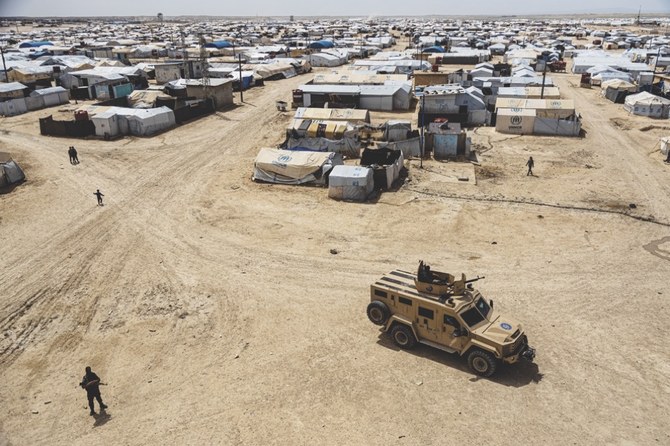
- Rights group alleges cruelty against Daesh militant prisoners and their families
JEDDAH: Kurdish authorities in northeast Syria on Thursday denied claims by Amnesty International that they tortured Daesh militants and their dependents detained in internment camps.
More than 56,000 prisoners with links to the Islamist militant group are still being held five years after Daesh were driven out of their last territory in Syria. They include militants locked up in prisons, and Daesh fighters’ wives and children in Al-Hol and Roj camps.
Amnesty secretary general Agnes Callamard said Kurdish authorities had “committed the war crimes of torture and cruel treatment, and probably committed the war crime of murder.”
The semi-autonomous Kurdish administration in northeast Syria said it “respects its obligations to prevent the violation of its laws, which prohibit such illegal acts, and adheres to international law.”
Any such crimes that may have been perpetrated were “individual acts,” it said, and asked Amnesty to provide it with any evidence of wrongdoing by its security forces and affiliates.
“We are open to cooperating with Amnesty International regarding its proposed recommendations, which require concerted regional and international efforts,” it said.
Kurdish authorities said they had repeatedly asked the international community for help in managing the camps, which required “huge financial resources.”
Al-Hol is the largest internment camp in northeast Syria, with more than 43,000 detainees from 47 countries, most of them women and children related to Daesh fighters.
Hamas is sending a delegation to Egypt for further ceasefire talks in the latest sign of progress

- US and Egyptian mediators have put to Hamas a proposal -– apparently with Israel’s acceptance — that sets out a three-stage process that would bring an immediate six-week ceasefire and partial release of Israeli hostages
BEIRUT: Hamas said Thursday that it was sending a delegation to Egypt for further ceasefire talks, in a new sign of progress in attempts by international mediators to hammer out an agreement between Israel and the militant group to end the war in Gaza.
After months of stop-and-start negotiations, the ceasefire efforts appear to have reached a critical stage, with Egyptian and American mediators reporting signs of compromise in recent days. But chances for the deal remain entangled with the key question of whether Israel will accept an end to the war without reaching its stated goal of destroying Hamas.
The stakes in the ceasefire negotiations were made clear in a new UN report that said if the Israel-Hamas war stops today, it will still take until 2040 to rebuild all the homes that have been destroyed by nearly seven months of Israeli bombardment and ground offensives in Gaza. It warned that the impact of the damage to the economy will set back development for generations and will only get worse with every month fighting continues.
The proposal that US and Egyptian mediators have put to Hamas -– apparently with Israel’s acceptance — sets out a three-stage process that would bring an immediate six-week ceasefire and partial release of Israeli hostages, but also negotiations over a “permanent calm” that includes some sort of Israeli withdrawal from Gaza, according to an Egyptian official. Hamas is seeking guarantees for a full Israeli withdrawal and complete end to the war.
Hamas officials have sent mixed signals about the proposal in recent days. But on Thursday, its supreme leader, Ismail Haniyeh, said in a statement that he had spoken to Egypt’s intelligence chief and “stressed the positive spirit of the movement in studying the ceasefire proposal.”
The statement said that Hamas negotiators would travel to Cairo “to complete the ongoing discussions with the aim of working forward for an agreement.” Haniyeh said he had also spoken to the prime minister of Qatar, another key mediator in the process.
The brokers are hopeful that the deal will bring an end to a conflict that has killed more than 34,000 Palestinians, according to local health officials, caused widespread destruction and plunged the territory into a humanitarian crisis. They also hope a deal will avert an Israeli attack on Rafah, where more than half of Gaza’s 2.3 million people have sought shelter after fleeing battle zones elsewhere in the territory.
If Israel does agree to end the war in return for a full hostage release, it would be a major turnaround. Since Hamas’ Oct. 7 attack stunned Israel, its leaders have vowed not to stop their bombardment and ground offensives until the militant group is destroyed. They also say Israel must keep a military presence in Gaza and security control after the war to ensure Hamas doesn’t rebuild.
Publicly at least, Israeli Prime Minister Benjamin Netanyahu continues to insist that is the only acceptable endgame.
He has vowed that even if a ceasefire is reached, Israel will eventually attack Rafah, which he says is Hamas’ last stronghold in Gaza. He repeated his determination to do so in talks Wednesday with US Secretary of State Antony Blinken, who was in Israel on a regional tour to push the deal through.
The agreement’s immediate fate hinges on whether Hamas will accept uncertainty over the final phases to bring the initial six-week pause in fighting — and at least postpone what it is feared would be a devastating assault on Rafah.
Egypt has been privately assuring Hamas that the deal will mean a total end to the war. But the Egyptian official said Hamas says the text’s language is too vague and wants it to specify a complete Israeli pullout from all of Gaza. The official spoke on condition of anonymity to talk about the internal deliberations.
On Wednesday evening, however, the news looked less positive as Osama Hamdan, a top Hamas official, expressed skepticism, saying the group’s initial position was “negative.” Speaking to Hezbollah’s Al-Manar TV, he said that talks were still ongoing but would stop if Israel invades Rafah.
Blinken hiked up pressure on Hamas to accept, saying Israel had made “very important” compromises.
“There’s no time for further haggling. The deal is there,” Blinken said Wednesday before leaving for the US
An Israeli airstrike, meanwhile, killed at least five people, including a child, in Deir Al-Balah in central Gaza. The bodies were seen and counted by Associated Press journalists at a hospital.
The war broke out on Oct. 7. when Hamas militants broke into southern Israel and killed over 1,200 people, mostly Israelis, taking around 250 others hostage, some released during a ceasefire on November.
The Israel-Hamas war was sparked by the Oct. 7 raid into southern Israel in which militants killed around 1,200 people, mostly civilians, and abducted around 250 hostages. Hamas is believed to still hold around 100 hostages and the remains of more than 30 others.
Since then, Israel’s campaign in Gaza has wreaked vast destruction and brought a humanitarian disaster, with several hundred thousand Palestinians in northern Gaza facing imminent famine, according to the UN More than 80 percent of the population has been driven from their homes.
The “productive basis of the economy has been destroyed” and poverty is rising sharply among Palestinians, according to the report released Thursday by the United Nations Development Program and the Economic and Social Commission for Western Asia.
It said that in 2024, the entire Palestinian economy — including both Gaza and the West Bank -– has so far contracted 25.8 percent. If the war continues, the loss will reach a “staggering” 29 percent by July, it said. The West Bank economy has been hit by Israel’s decision to cancel the work permits for tens of thousands of laborers who depended on jobs inside Israel.
“These new figures warn that the suffering in Gaza will not end when the war does,” UNDP administrator Achim Steiner said. He warned of a “serious development crisis that jeopardizes the future of generations to come.”
Syria says Israeli strike outside Damascus injures eight troops
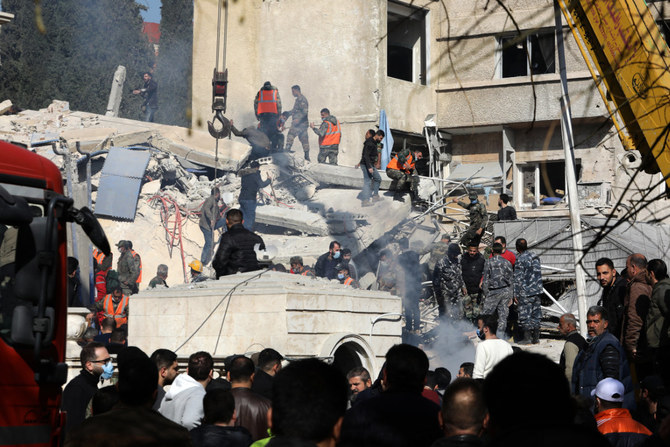
- A security source said the strike hit a building operated by government forces
- Defense ministry acknowledged only that the strike caused some material damage
An Israeli airstrike on the outskirts of Damascus injured eight Syrian military personnel late on Thursday, the Syrian defense ministry said, the latest such attack amid the war in Gaza.
The Israeli strike, launched from the occupied Golan Heights toward “one of the sites in the vicinity of Damascus,” caused some material damage, the Syrian defense ministry said in a statement.
The strike hit a building operated by Syrian security forces, a security source in the alliance backing Syria’s government earlier told Reuters.
The Israeli military said it does not comment on reports in the foreign media.
Israel has for years been striking Iran-linked targets in Syria and has stepped up its campaign in the war-torn country since Oct. 7, when Iran-backed Palestinian militants Hamas crossed into Israeli territory in an attack that left 1,200 people dead and led to more than 250 taken hostage.
Israel responded with a land, air and sea assault on the Gaza Strip, escalated strikes on Syria and exchanged fire with Lebanese armed group Hezbollah across Lebanon’s southern border.
The security source said the location struck in Syria on Thursday sat just south of the Sayyeda Zeinab shrine, where Hezbollah and Iranian forces are entrenched.
But the source said the site struck was not operated by Iranian units or Hezbollah.



